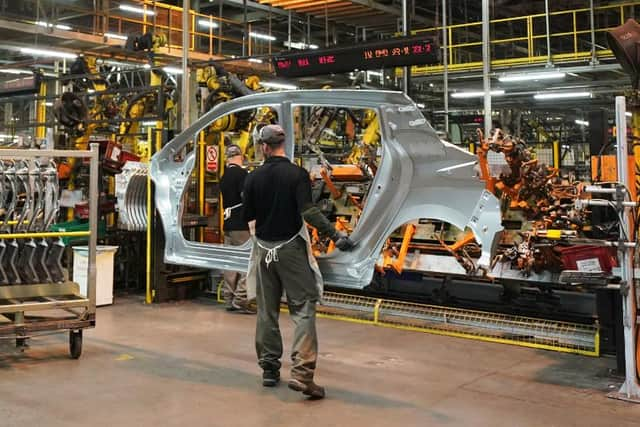Nissan Sunderland: how long has Nissan factory been producing cars in North East - and how did Brexit save jobs?
and live on Freeview channel 276
Thousands of jobs at Nissan's Sunderland plant have been saved due to the Brexit trade deal struck between the UK and the EU.
The plant, which employs around 7,000 people directly and supports 75,000 jobs across Europe, was at risk of being closed if the UK left the EU without a deal, the car manufacturer warned in 2020.
Advertisement
Hide AdAdvertisement
Hide AdBut top bosses at the Japanese company have confirmed the plant's future is secure, as it shifts more of its manufacturing to the UK to take advantage of the trade deal in place.


Prime Minister Boris Johnson welcomed the news, calling it a "great vote of confidence in the UK" and "fantastic news for the brilliant" Nissan Sunderland workforce."
How long has Nissan produced cars in Sunderland?
Nissan’s Sunderland plant opened in July 1984.
The plant was built on the site of the former RAF Usworth airfield, near the A19 and A1231.
It wasn't until two years later, in 1986, that the first car - a Bluebird - rolled off the line, as it produced more than 5,000 cars in its first year.
Advertisement
Hide AdAdvertisement
Hide AdIts production has come a long way since then, when a workforce of 470 oversaw operations - it now boasts around 7,000 employees.
In 2019 the Sunderland plant surpassed the 10 million mark for the number of cars it had produced over the past 33 years.
It was the fastest car factory in the UK to reach the landmark figure - and means a car was built on average every two minutes at the plant.
Why did Nissan open a plant in Sunderland?
Following talks between Nissan and the UK government to build a car plant, a near 800-acre greenfield site in Sunderland was highlighted in March 1984.
Advertisement
Hide AdAdvertisement
Hide AdThe land was offered to Nissan at an agricultural price of around £1,800 per acre, as an incentive for the Japanese company to forge roots in the north east.
The region had undergone a period of industrial decline after the closure of most of the shipyards on the Wear and Tyne and coal mines on the once prosperous Durham coalfield.
It led to high unemployment in the area, meaning there was a large and skilled workforce for Nissan to call upon to get the plant up and running quickly.
The site also has good transport links near to major trunk roads such as the A1 and A19, within easy driving distance of the international Newcastle Airport, and close to major shipping ports.
Why might Nissan have left Sunderland?
Advertisement
Hide AdAdvertisement
Hide AdThe uncertainty around the Brexit trade deal had caused some concern among businesses near and far from the UK, with the prospect of no deal being struck between the UK and the EU.
Reports emerged in Germany of plans to close the Sunderland plant, but this speculation was denied by Nissan, yet talk over its future in the UK remained.
In 2020, Nissan's chief operating officer Ashwani Gupta, warned that tariffs on cars and components without a trade deal would make the plant “unsustainable".
"If it happens without any sustainable business case obviously it is not a question of Sunderland or not Sunderland, obviously our UK business will not be sustainable, that's it," he told Reuters.
Advertisement
Hide AdAdvertisement
Hide Ad"If we are not getting the current tariffs, it's not our intention but the business will not be sustainable. That's what everybody has to understand."
Why is Nissan now staying in Sunderland?
The plant produces around 350,000 cars a year with 50 percent of the cars made there also sold around Europe, further highlighting its importance to the market.
As a result of the trade deal, Nissan will move additional battery production close to the plant to take advantage of the zero tariffs on EU exports.
Zero tariffs are dependent on at least 55 percent of the car’s value being derived from the UK or EU.
Advertisement
Hide AdAdvertisement
Hide AdThe batteries, currently being made and imported from Japan, will be used in Nissan’s Leaf electric cars, Mr Gupta confirmed.
As well as the Leaf, cars produced in Sunderland include the Qashqai and the Juke.
Nissan aims to have an electrified version of all its cars sold to Europe by the end of 2023, allowing the customer the choice of how quickly they switch from petrol or diesel.
“As long as the current business conditions are kept, we are sustainable, not only in Sunderland, but across Europe,” added Mr Gupta.
What has the response been to the news?
Advertisement
Hide AdAdvertisement
Hide AdGraeme Miller, leader of Sunderland City Council, said it was excellent news for the region.
“It helps cement the city’s well-established track record in future technologies, which is vital to the city’s economy as well as to the wider economy of the region and UK,” he said.
“We know how important electrification is to the automotive and advanced manufacturing sector moving forward and this announcement not only reinforces Sunderland’s reputation in electric vehicle production but also as the UK centre for battery manufacturing.”
